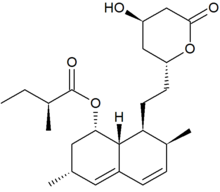Lipidology

Lipidology is the scientific study of lipids. Clinical studies on lipid metabolism in the body have led to developments in therapeutic lipidology for disorders such as cardiovascular disease.
History[]
Compared to other biomedical fields, lipidology was originally less popular since the constant handling of oils, smears, and greases was unappealing and separation was difficult.[1] It was not until 2002 that the term "lipidomic" first appeared in a published paper.[2]
The field became more popular following the advent of chromatography which allowed lipids to be isolated and analyzed.[1] The field was further popularized following the cytologic application of the electron microscope which found that many metabolic pathways take place on the cell membrane, whose properties are strongly influenced by its lipid composition.[1]
Clinical lipidology[]
The Framingham Heart Study and other epidemiological studies have found a correlation between lipoproteins and cardiovascular disease.[3]
A class of lipids known as phospholipids help make up what is known as lipoproteins, and a type of lipoprotein is called high density lipoprotein (HDL).[4] A high concentration of high density lipoproteins-cholesterols (HDL-C) have what is known as a vasoprotective effect on the body, a finding that correlates with an enhanced cardiovascular effect.[5] There is also a correlation between those with diseases such as chronic kidney disease, coronary artery disease, or diabetes mellitus and the possibility of low vasoprotective effect from HDL.[6]

Therapeutic lipidology[]
Statins are a class of drugs used to treat cardiovascular disease by lowering lipid levels. Statins have shown to reduce new cardiovascular events by 30-40%.[7] However, complications may still arise even after taking the drug and some patients are statin-intolerant. Lipoprotein apheresis therapy is another nonsurgical treatment for reducing LDL-C concentrations.
PCSK9 inhibitors are a new drug that can replace statins and lipoprotein apheresis therapy.[7] For patients that are statin-intolerant, PCSK9 inhibitors can provide a therapeutic alternative.
Lipidomics[]
Lipidomics is the complete profile of all lipids in a biological system. Methods of lipidomic analysis include mass spectrometry and chromatography.[2] Monitoring lipid concentration can reveal much about an organism's health.
See also[]
References[]
- ^ Jump up to: a b c Kates, p. 275-276.
- ^ Jump up to: a b Holčapek, Michal (July 2015). "Lipidomics". Analytical and Bioanalytical Chemistry. 407 (17): 4971–4972. doi:10.1007/s00216-015-8740-0. ISSN 1618-2642. PMID 25963650.
- ^ Therapeutic lipidology, p. vii-viii
- ^ Feingold, Kenneth R.; Grunfeld, Carl (2000), De Groot, Leslie J.; Chrousos, George; Dungan, Kathleen; Feingold, Kenneth R. (eds.), "Introduction to Lipids and Lipoproteins", Endotext, MDText.com, Inc., PMID 26247089, retrieved 2018-12-14
- ^ Speer, Thimoteus; Meinitzer, Andreas; März, Winfried; Fliser, Danilo; Lüscher, Thomas F.; Landmesser, Ulf; von Eckardstein, Arnold; Laufs, Ulrich; Böger, Rainer H. (2017-05-21). "Symmetric dimethylarginine, high-density lipoproteins and cardiovascular disease". European Heart Journal. 38 (20): 1597–1607. doi:10.1093/eurheartj/ehx118. ISSN 0195-668X. PMID 28379378.
- ^ Bell, David S.H. (October 1996). "Diabetes mellitus and coronary artery disease". Coronary Artery Disease. 7 (10): 715–722. doi:10.1097/00019501-199610000-00004. ISSN 0954-6928. PMID 8970762.
- ^ Jump up to: a b Julius, Ulrich (November 2017). "History of lipidology and lipoprotein apheresis". Atherosclerosis Supplements. 30: 1–8. doi:10.1016/j.atherosclerosissup.2017.05.034. PMID 29096824.
- Books
- Kates, Morris (1972), Techniques of lipidology; isolation, analysis and identification of lipids, Laboratory Techniques in Biochemistry and Molecular Biology, 3, Amsterdam, New York: North-Holland Pub. Co.American Elsevier, pp. 269–610, doi:10.1016/S0075-7535(08)70544-8, ISBN 978-0444103505
- Therapeutic lipidology. Totowa, N.J.: Humana. 2007. ISBN 9781597455336.
- Biochemistry stubs
- Lipids
- Biochemistry
- Branches of biology
